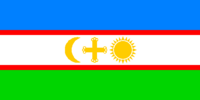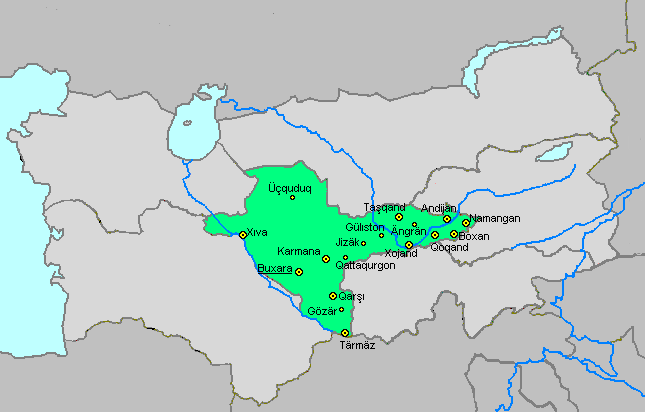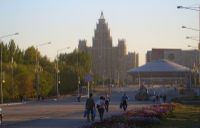Üzbekistan

| |
| Motto: MOTTO | |
| Subdivision of: | Turkestan |
| Cities: | |
| Capital: | Buxara |
| Largest: | Buxara |
| Other: | Taşqand, Namangan, Andıjan, Boxan, Qarşı, Xıva, Qoqand, Tärmäz, Xojand |
| Languages: | |
| Official: | Üzbek |
| Others: | Qazaq, Kırğız, Tajik, Qaraqalpaq, Türkümän (Turkmen) |
| Vıloya (Governor): | Enver Jubon-ulı |
| Area: | AREA |
| Population: | POPULATION ADJECTIVE |
| Established: | 1950, Administrative Reform |
Üzbekistan is the most populous province of Turkestan, due in large part to the fertile Farğana Valley.
Administration
Government
DESCRIPTION ON HOW THE SUB-NATIONAL ENTITIY IS GOVERNED
Administrative Divisions
Like all six Vıloyatlar (Provinces) of Turkestan, Üzbekistan is further divided into Aymaqs. The capital Buxara is one of two "Urban Aymaqs" administered separately on a Provincial level; this is largely due to its large population. Including Buxara, there are 29 aymaqs in Üzbekistan Province.
History
What is now the Province of Üzbekistan was once divided up between several independent Xanates, particularly Buxara, Xıva, Qoqand and Samarqand. It was only after the Snorist takeover in 1948 that Üzbekistan was unified as a single political and administrative unit.
Üzbekistan has probably the least consciousness of its identity as a distinct Province. This is not to say that Üzbeks have no ethnic consciousness, but their sense of themselves as a people is less connected to their Vıloyat. They see themselves as Üzbek residents of Buxara, or Xıva, or Andıjan, or whatever their city is.
Geography
Üzbekistan is one of the most geographically diverse of the six Provinces of Turkestan. It includes the fertile Farğana Valley in the East, surrounded by the high mountains of the Ala Tau and Pamir ranges, the two great rivers of the Sır Darya and Amu Darya, the arid semidesert of the West, and several large cities, most notably the capital Buxara.
Borders
Üzbekistan is bordered by:
North: Qazaqstan Province.
Northwest: Qaraqalpağıstan Province.
West: Türkümänistan Province.
South: Moghul National Realm.
Southeast: Tajikistan Province.
East: Kırğızstan Province.
Map
Map showing the location of Üzbekistan in Turkestan and its main cities.
Economy
Üzbekistan is one of the major agricultural centres of Turkestan, with cotton-growing, wheat-farming and sericulture all playing prominent roles in the province's economy. It also contains several of the great industrial centres of the country, with ÜKÜ Armaments being located in the city of Karmana, and other major companies in Buxara, Xıva and Andıjan.
Üzbekistan Province also supports a large tourist industry, with the ancient Silk Road cities of Buxara, Xıva, Qoqand and Tärmäz being several of the main hotspots.
Culture
Üzbek culture is a traditionally Sart, agricultural and trading culture. Üzbeks are well-known as traders and farmers; local tradition states that it is "almost a sin" not to grow something if you have the opportunity, and the other peoples of Turkestan make jokes about the Üzbeks and their trading propensities (see Turkestani Ethnic Humour).
| |||
|---|---|---|---|
| Provinces | |||
| Kırğızstan | Qaraqalpağıstan | (South) Qazaqstan | Tajikistan | Türkümänistan | Üzbekistan | |||
| Urban Aymaqs | |||
| Almalıq | Buxara | |||



